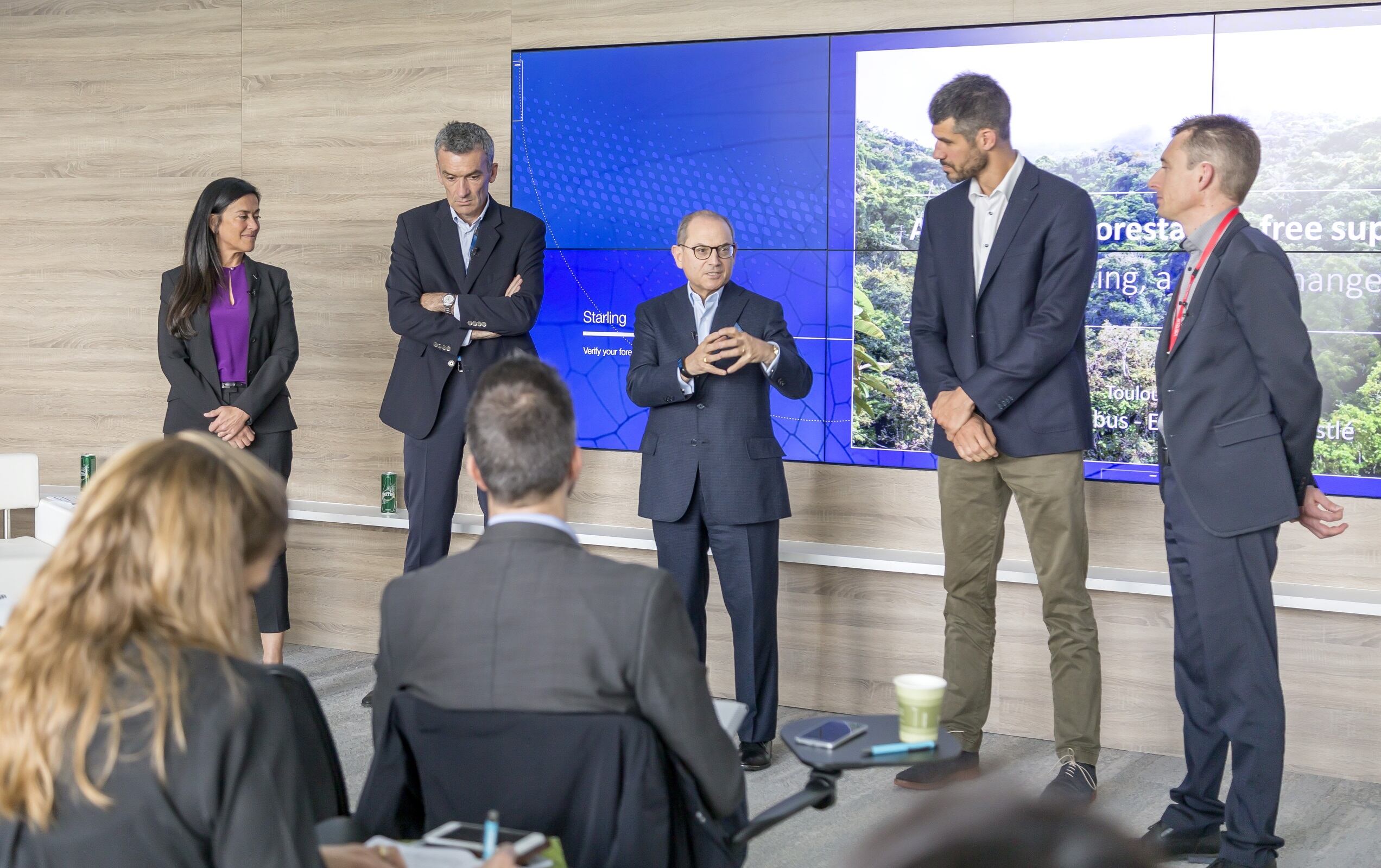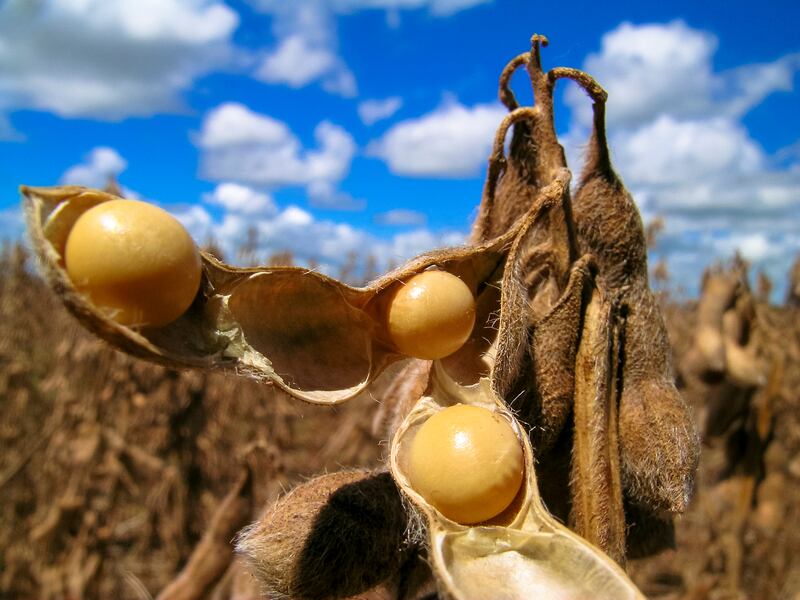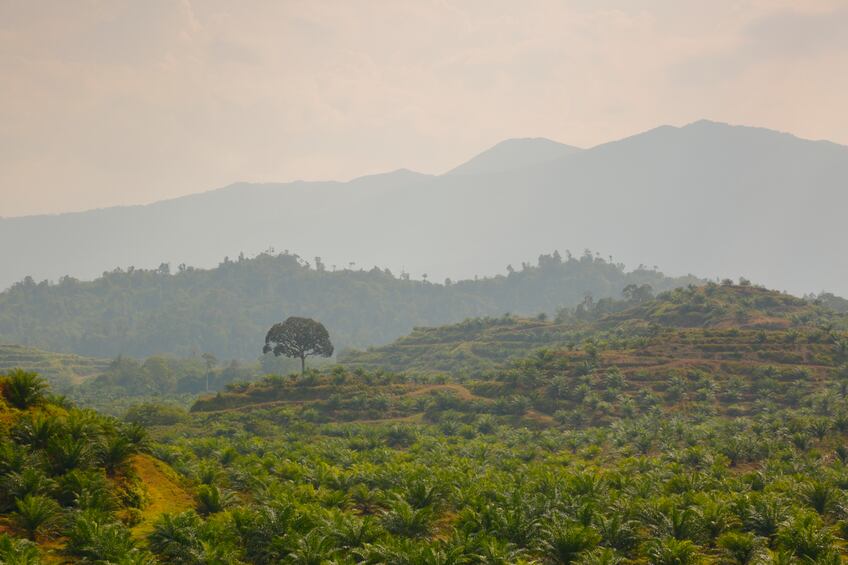Nestlé revealed that 77% of the 12 key commodities it purchases that contribute towards deforestation are verified deforestation free as of March 2019. This compares to 63% in 2018.
Head of operations Magdi Batato is hopeful that this upward trajectory will enable the group to reach its target of 100% by 2020. “The 100% deforestation free next year is a reality,” he told journalists at a press briefing in Toulouse, France.
Nestlé first made the commitment to eradicate deforestation from its supply chain in 2010. Speaking at the headquarters of Air Bus, with whom Nestlé partners for its satellite monitoring system to track palm oil deforestation, Batato outlined the scale of the challenge.
“When we made that commitment 10 years ago we didn’t know what we were embracing, the complexity of the value chain. We had to understand what was going on, to have a more transparent value chain, to look at all the 12 major commodities we source. The first thing was transparency, understanding what was going on. Actually, this is quite complex. This is not easy,” he noted.
Forests cover about 30% of the planet’s landmass – but they are shrinking at an alarming rate. According to the World Bank, between 1990 and 2015 there has been a 3% decline forested land globally – that equates to 1.3 million square kilometres, or an area roughly the size of South Africa. Much deforestation has been driven by the growing demand for agricultural commodities, such as palm oil, soy and cocoa.
Palm oil is a case in point. Nestlé is now able to trace 94% of the palm oil it sources back to the mill. But with smallholders accounting for 40% of global palm oil production, the company can only trace 54% of its supply back to the plantation. Nestlé therefore faces a problem: How can the company verify that the palm oil going into the mills that supply it is deforestation free?
Currently it can’t. The company can only verify that 60% of the palm oil it procures is not linked to deforestation. Of the 425’000MT it purchases every year, 8% is fully traceable, 49% is verified on the ground and 3% is verified “from the sky” using Airbus Starling satellite monitoring.
Nestlé believes that Starling satellite monitoring could play a more important role as part of its future “tool box” to tackle deforestation.
From data to action
Back in 2010, when the Swiss food giant started its journey on deforestation, the company was reliant on “boots on the ground” to verify suppliers. This was a massive undertaking. So when Nestlé implemented Airbus’ monitoring technology last year it was something of a “blessing”, Batato reflected.
Starling uses satellite technology to track areas of deforestation and cross reference these against a map of mills and plantations that supply Nestlé.
Through Starling’s imagery, sensors, algorithms and machine learning, the system is able to identify deforestation events and alert Nestlé buyers. It can also help identify what the likely causes are, from other commodities such as rubber to urbanisation. This allows Nestlé to focus its efforts on deforestation linked to its own supply chain.
Benjamin Ware, global head of responsible sourcing, said that the tool has transformed how Nestlé approaches deforestation in palm oil: “In the past we were blind, today we are not blind – we know where it happens.”
When deforestation is identified Starling becomes a decision making tool that helps inform Nestlé’s responsible procurement team.
Ware said that the action then taken will depend on the data. If it is a small area of deforestation linked to smallholders (who are likely “starving if we are honest”) the action the company takes will differ from if a large area of land is cleared and this can be linked to a plantation owner or palm oil company.
“With smallholders let’s be very careful. But with plantation owners, a company, they are educated, they know what they are doing, they are responsible and they are accountable,” he stressed.
The next step for Nestlé buyers is to “pick up the phone” and engage with the supplier.
“In the past we were blind and you were presumed innocent. Today we have evidence there is something happening in the supply chain. You are not presumed innocent any more. You are presumed guilty. You have to show evidence that your operations are not linked to this deforestation. That is the big change from being reactive and having to go on the ground completely blind to having the data and running the investigation.”
Following Starling's introduction, 60% of all Nestlé palm oil suppliers got a call warning of deforestation patches in their supply chain and demanding action. In total, the company has blacklisted 10 companies – roughly 5% of the total palm oil supply chain.
The risk of de-listing suppliers is that it drives them towards less sustainable practices and further deforestation. For Ware, this is a “trade-off”.
“We need to make decisions. When it is linked to smallholder deforestation we are keen to listen. But we are in 2019, I am over it. We don’t have time anymore.”
Batato added that with large palm oil suppliers, there is evidence that de-listing them will prompt a response. He pointed to the example of one supplier who was blacklisted due to deforestation concerns – and then re-listed three or four years later after Nestlé was happy appropriate measures had been taken.
“Things have changed since 2010. The big companies that are respectful will change,” he suggested. “It is about impacting and influencing others. It is not about simply refusing everything because if you do nothing changes. At least here it’s a bit more factual.”

The smallholder dilemma
For smallholders, the story is different. “The idea here is not to punish people. Some extreme views would say you just de-list everybody. If we do that how are these smallholders going to live? Maybe some other companies will buy [the palm oil they produce] which doesn’t influence deforestation. We chose the difficult path,” Batato argued.
But if a more flexible approach is needed to support smallholders transition to sustainable practices, it is nevertheless vital to end their contribution to deforestation.
Working with NGO Earthworm, which is funded by Nestlé and a range of other corporations, the approach is to educate and improve agricultural practices. This, CEO Bastien Sachet told FoodNavigator, can lead to win-wins that improve productivity and output – and therefore smallholder incomes – without deforestation.
Here too, satellite monitoring has a role to play. By using a ‘base map’ that tracks changes to the forest landscape over a period of 30 years, Earthworm is able to identify the age of smallholder plantations.
“When you start leveraging satellite technology there are other opportunities that become evident. Most of the smallholder plantations… are quite old. Many of them are 20 years old… [this makes them] difficult to harvest and the yield is one-quarter of what it could be.
“Because of the base map looking at 30 years of imagery you can calculate the age of the plantations… If replanting needs to happen to have better yields and more efficient plantations that can happen. There is an opportunity to increase yields without deforestation and tackle poverty.”
‘This is pre-competitive’
Sachet believes data is also an important tool to facilitate dialogue between the different stakeholders, including governments, civil society, NGOs and industry.
“When you don’t have a map, the discussion is very political. It is about the west trying to stop Indonesia from developing, the west trying to push Indonesia to stay in poverty and not develop palm oil to grow their economy. The difference is, if you put a map with facts on the table, it becomes tangible. The minds start to find solutions,” he observed.
Batato was also clear on the need for collaboration to tackle deforestation in the food value chain.
“Nestlé is big but we are small at the same time… [Today] is a call to arms for others to join. We don’t consider this as a competitive story. This is pre-competitive. The more other companies, governments, entities, institutions join in, the more progress we will get.”
And progress is needed from a business perspective as much as anything else in order to safeguard the “quantity and quality” of the raw materials Nestlé turns into finished products and mitigate the risks associated with climate change.
“We are in business – it is all about mitigating climate change to secure supply,” Ware added.
Potential for other commodities
Nestlé plans to roll Starling out to complement the existing levers it uses to tackle deforestation in other core commodities. Tests are already underway in paper and pulp. Here the issue is different: it is more about monitoring biodiversity and soil conditions in productive forests and ensuring producers are not relying on fast rotation crops such as pine. Pilots are being run over four areas: Russia, Indonesia, Canada and the US.

Nestlé also wants to extend the Starling system to soy – but the technology is yet to be piloted. Batato revealed that the company is looking at direct and indirect soy – animal feed etc – in its supply chain. Nestlé is on a “journey” towards sustainable soy and currently buys Round Table for Responsible Soy (RTRS) credits to cover 25% of its supply. “The idea is to go to 100%,” he said.
Elsewhere, Airbus is working with an unnamed chocolate producer to adapt the Starling system to cover cocoa. A key technical challenge was developing appropriate methods of monitoring the distinct ways cocoa encroaches in the forest, Patrick Houdry, Airbus head of sales agriculture and forest solutions, explained.
Trials are already being conducted in West Africa and Airbus expects to “go global” with this monitoring system in 2019.

